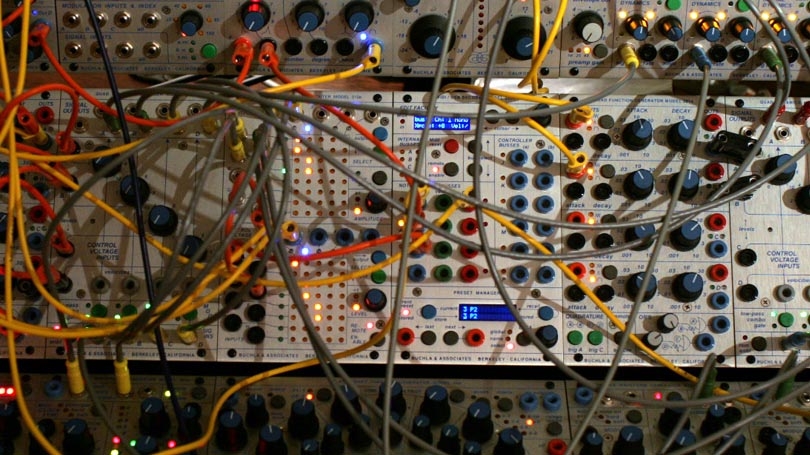
An image of the Buchla 200e system, a digitally-controllable implementation of his classic 200 system. (Photo credit: Michael Tiemann, published under the CC-BY-SA license)
Ezra Teboul studied electronic music hardware and do-it-yourself culture in the Digital Musics program at Dartmouth with Spencer Topel, Aden Evens, and Theodore Levin. He is currently working as an independent researcher, performer and audio technician in New York City.
“My master’s thesis at Dartmouth focused on the history of do-it-yourself culture in electronic music, specifically discussing a few designers through a component-level analysis of their instruments and complementing this with interviews. I showed that those musicians willing to tinker with the technology that made their music electronic would often develop a non-traditional and personal approach to engineering, effectively linking original electronically generated timbres and music structures to counter-intuitive innovations in circuit and interface design.
Few practitioners are as archetypal of these developments as Bob Moog and Donald Buchla, arguably the two most influential designers of contemporary electronic music systems. Although Trevor Pinch’s major study of Bob Moog in Analog Days: The Invention and Impact of the Moog Synthesizer provides context of Moog’s contribution to the revolution in sound production, discussions of Buchla’s heritage remain sparse and usually focused on his collaborations rather than his technical innovations and their musical counterparts. With the help of the graduate studies’ Alumni Research Grant, I had a chance to record an interview with Don Buchla and discuss some of those points, strong with the research experience I had built with my thesis.
Buchla’s beginnings make him Moog’s artistic counterpart: if both implemented versions of voltage control (ways for some electrical signals to control the parameters of another in an analog synthesizer), Buchla’s colorful, non-traditional vision of electronic “music-boxes” contrasted sharply with Moog’s sober, practical layouts. Differences were visible at the circuit level as well: if Moog’s factory produced somewhat accurate and reliably identical products, Buchla’s shop produced highly individualized and unique electronic systems, with products often containing slight variations. In many ways, Buchla and Moog matched their surroundings. The latter developed his business while stalling on his electrical engineering dissertation at Cornell, but Buchla was a physicist who taught himself electronics while at UC Berkeley, paid bills with NASA contracting work, and built art-oriented devices for himself and his friends on his free time.
Perhaps most telling is Buchla’s rejection of the traditional keyboard interface in his modular synthesis systems. That is arguably what made Moog’s products slowly gain traction in the popular music world (namely with the pivotal Wendy Carlos album Switched On Bach, reproducing Bach pieces with electronic timbres using a Moog modular system). In that sense, Buchla’s designs were and remain more unusual than Moog’s. Throughout my thesis, a number of designers described Buchla as, if not a teacher, a strong inspiration. This independent, innovative yet sometimes oblique and consistently anti-commercial spirit remained clear through my discussion with him. He appreciates the recognition, but does not build on it. He simply has ideas he’s still working through, at 79, creating analog / digital systems for music like he always has. He won’t say much about the inspiration behind any of the circuits, and does not explicitly try to justify doing things differently. What does get him to talk, however, is music: rather than describe what justified his novel lightning and thunder controllers, he enthusiastically described a performance he had done previously with a marimba player and those controllers. Rather than talk about schematics, he happily recounted some of the installation pieces he had developed, his upcoming concerts, and his performative collaborations.
To contrast his work, the Alumni Research Grant also allowed me to interview his son, Ezra Buchla. A musician, synthesizer designer and performer in his own right, Ezra Buchla shares his father’s modesty and innovative spirit, but with a more explicit openness to linking acoustic instruments and electro-acoustic systems to digital synthesis engines – as exemplified with his work on the aleph, a device developed with Brian Crabtree of Monome.
Together these two generations of synthesizer designers offer a unique glimpse of the past, present, and future of innovation in electronic music hardware. The interviews I’ve recorded with them are currently being used as the material for multiple papers and a presentation I’ll be giving in April at London’s Science Museumas part of the Alternative Histories of Electronic Music conference.”